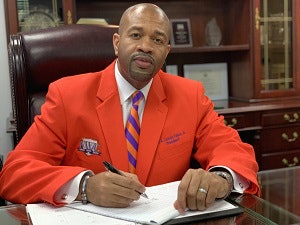A. Zachary Faison, Jr.’s venture into higher education was, in large part, “providentially destined,” he says.
With family members serving as educators, administrators and educational consultants, and a transformative undergraduate experience at Albany State University (ASU), Faison set out with an “unshakable confidence” and responsibility to uplift his community through service in the historically Black college and university (HBCU) sphere.
“Once I became a student, the experience changed the course of my life,” Faison says of his time at ASU. “The cultural solidarity and academic intentionality of the community towards the pursuit of Black excellence in every endeavor was something I had never seen or experienced. I was simply awestruck and forever changed!”
The Atlanta native sought to become a leader that could “pay forward” the same investments that numerous faculty, staff, administrators and ASU’s first woman president Dr. Portia Holmes Shields made to him.
 A. Zachary Faison, Jr.
A. Zachary Faison, Jr.Faison earned a juris doctorate at the University of Georgia School of Law and completed postdoctoral studies at Harvard University Graduate School of Education’s Institute for Educational Management.
He progressively garnered a multifaceted understanding of institutional governance around student and external affairs, enrollment management, economic development, data-informed decision-making, philanthropy and more from his administrative and professorial roles at ASU, Edward Waters College (EWC), Mississippi Valley State University, Virginia Union University and, most recently, Tuskegee University, where he served as the general counsel and vice president of external affairs.
In traversing the higher education landscape, Faison assumed the presidency of EWC in Jacksonville, Florida, this August at age 37, making him the youngest sitting president and CEO of an HBCU.
His prior legal training and experience – including service as an assistant district attorney – will allow him to think critically and strategically, take an analytical and data-informed approach to problem-solving and leverage experience with contracts and business transactions that benefit EWC and students, he says.
Faison’s leadership is marked with an urgent drive to make the college a “best-in-class” institution under the mantra “Emerging Eminence.” His vision is to cultivate an environment of academic excellence and student achievement quantifiably demonstrated by successful graduation outcomes for students but also their gainful employment and success in graduate and professional school, he says.
The scholar-educator recently launched the President’s Distinguished Lecture Series – the first series featuring poet Nikki Giovanni – to broaden students’ perspectives and cultural awareness.
Moreover, EWC has been mobilizing students to head to the polls over the last few weeks with a voter registration rally featuring Angela Rye and the college’s designation as an early-voting site.
Students are also reading Dr. Ibram X. Kendi’s Stamped from the Beginning: The Definitive History of Racist Ideas in America throughout the year as part of Faison’s campus-wide shared reading and engagement initiative. The initiative brings administrators, faculty, staff, alumni and students together to discuss themes in the book.
During his presidency, Faison has plans to develop a comprehensive Presidential Scholarship Program with an experiential learning connection with corporate and business partners, a College Honors Program, and a Pre-Law Program, among other priorities.
An upcoming curriculum review will assess the strength of academic programs to ensure they are market relevant and result in positive post-graduate results, Faison adds.
Making EWC a destination of philanthropic investment and investing in faculty and staff similarly falls under Faison’s vision to transform “EWC to EWU by 2022.”
In early August, Faison and his wife, Tyciee, donated $25,000 to establish the EWC Professional and Scholarly Development Fund. Developing the fund, Faison charged faculty to increase EWC’s competitive profile and the quality of academic programs through research, grantsmanship and relevant and effective pedagogy, he says.
“Faculty and staff need the resources and professional development to answer that charge,” Faison adds. “$25,000 certainly won’t wholly cover that need entirely but my wife and I thought it would be an important and significant enough seed to evidence our support and belief in our faculty and staff, and hopefully inspire others to give in support of the tremendous potential for increased scholarship and overall productivity that we believe currently exists amongst EWC’s dedicated faculty and staff.”
The leader has been recognized as one of the nation’s Top 40 attorneys under 40 by the National Bar Association, a “Top 40 under 40” Young Professional by the Greenwood Commonwealth, a “Top 40 under 40” nominee by the Mississippi Business Journal and an inaugural awardee on Albany State University’s “Top 50 ASU Alumni under 50.”
Pushing the needle forward on Edward Waters College’s competitiveness and eminence will require innovation, boldness and audacity, according to Faison.
“Our future posterity will not be determined by the prominent historicity of our past but by the contemporaneous relevance of our today and our audacity to innovate in preparation for our tomorrow,” Faison says.
Tiffany Pennamon can be reached at [email protected]. You can follow her on Twitter @TiffanyPennamon.



















